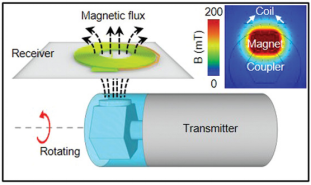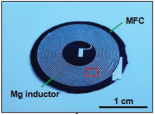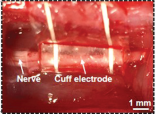Bioresorbable electronic technologies form the basis for classes of biomedical devices that undergo complete physical and chemical dissolution after a predefined operational period, thereby eliminating the costs and risks associated with secondary surgical extraction. A continuing area of opportunity is in the development of strategies for power supply for these systems, where previous studies demonstrate some utility for biodegradable batteries, radio frequency harvesters, solar cells, and others. Prof. Guo’s group introduces a type of bioresorbable system for wireless power transfer, in which a rotating magnet serves as the transmitter and a bioresorbable antenna as the remote receiver, with capabilities for operation at low frequencies (<200 Hz). Systematic experimental and numerical studies demonstrate several unique advantages of this system, most significantly the elimination of impedance matching and electromagnetic radiation exposure presented with the types of radio frequency energy harvesters explored previously. These results add to the portfolio of power supply options in bioresorbable electronic implants.
More details can be seen from Advanced FunctionalMaterials, 2019, 29, 1905451.


